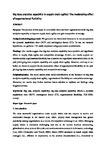Big data analytics capability in supply chain agility: The moderating effect of organizational flexibility
| dc.contributor.author | Dubey, R | |
| dc.contributor.author | Gunasekaran, A | |
| dc.contributor.author | Childe, Stephen J | |
| dc.date.accessioned | 2018-02-26T11:02:31Z | |
| dc.date.available | 2018-02-26T11:02:31Z | |
| dc.date.issued | 2019-09-12 | |
| dc.identifier.issn | 1751-1348 | |
| dc.identifier.issn | 1758-6070 | |
| dc.identifier.uri | http://hdl.handle.net/10026.1/10854 | |
| dc.description.abstract |
The purpose of this paper is to examine when and how organizations build big data analytics capability to improve supply chain agility and gain competitive advantage. We grounded our theoretical framework in two perspectives the dynamic capabilities view (DCV) and contingency theory (CT). To test our research hypotheses, we gathered 173 usable-responses using a pre-tested questionnaire. Our results suggest that big data analytics capability has a positive and significant effect on supply chain agility and competitive advantage. Further, our results support our hypothesis that organizational flexibility has a positive and significant moderation effect on the path joining big data analytics capability and supply chain agility. However, contrary to our belief, we found no support for the moderation effect of organizational flexibility on the path joining big data analytics capability and competitive advantage. The study makes some useful contributions to the literature on big data analytics capability, supply chain agility, organizational flexibility and competitive advantage. Moreover, our results may further motivate future scholars to replicate our findings using longitudinal data. | |
| dc.format.extent | 2092-2112 | |
| dc.language | en | |
| dc.language.iso | en | |
| dc.publisher | Emerald | |
| dc.subject | analytics capability | |
| dc.subject | Big Data | |
| dc.subject | big data analytics capability | |
| dc.subject | Contingency theory | |
| dc.subject | dynamic capability view | |
| dc.title | Big data analytics capability in supply chain agility: The moderating effect of organizational flexibility | |
| dc.type | journal-article | |
| dc.type | Journal Article | |
| plymouth.author-url | https://www.webofscience.com/api/gateway?GWVersion=2&SrcApp=PARTNER_APP&SrcAuth=LinksAMR&KeyUT=WOS:000487037400019&DestLinkType=FullRecord&DestApp=ALL_WOS&UsrCustomerID=11bb513d99f797142bcfeffcc58ea008 | |
| plymouth.issue | 8 | |
| plymouth.volume | 57 | |
| plymouth.publication-status | Published | |
| plymouth.journal | Management Decision | |
| dc.identifier.doi | 10.1108/MD-01-2018-0119 | |
| plymouth.organisational-group | /Plymouth | |
| plymouth.organisational-group | /Plymouth/Faculty of Arts, Humanities and Business | |
| plymouth.organisational-group | /Plymouth/Faculty of Arts, Humanities and Business/Plymouth Business School | |
| plymouth.organisational-group | /Plymouth/REF 2021 Researchers by UoA | |
| plymouth.organisational-group | /Plymouth/REF 2021 Researchers by UoA/UoA17 Business and Management Studies | |
| plymouth.organisational-group | /Plymouth/Users by role | |
| plymouth.organisational-group | /Plymouth/Users by role/Academics | |
| dcterms.dateAccepted | 2018-02-24 | |
| dc.rights.embargodate | 2019-9-6 | |
| dc.identifier.eissn | 1758-6070 | |
| dc.rights.embargoperiod | Not known | |
| rioxxterms.versionofrecord | 10.1108/MD-01-2018-0119 | |
| rioxxterms.licenseref.uri | http://www.rioxx.net/licenses/all-rights-reserved | |
| rioxxterms.type | Journal Article/Review |


